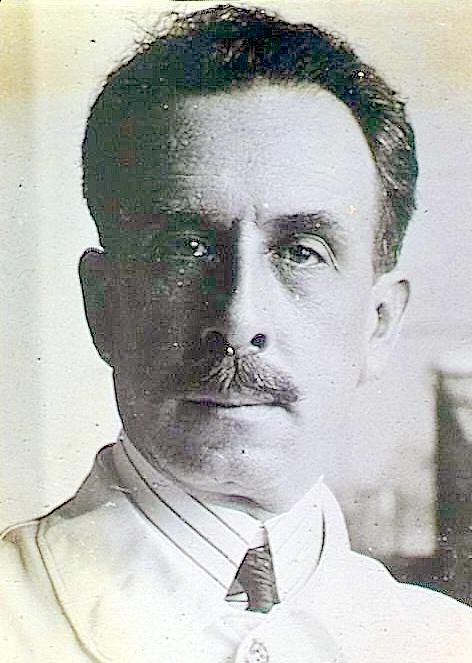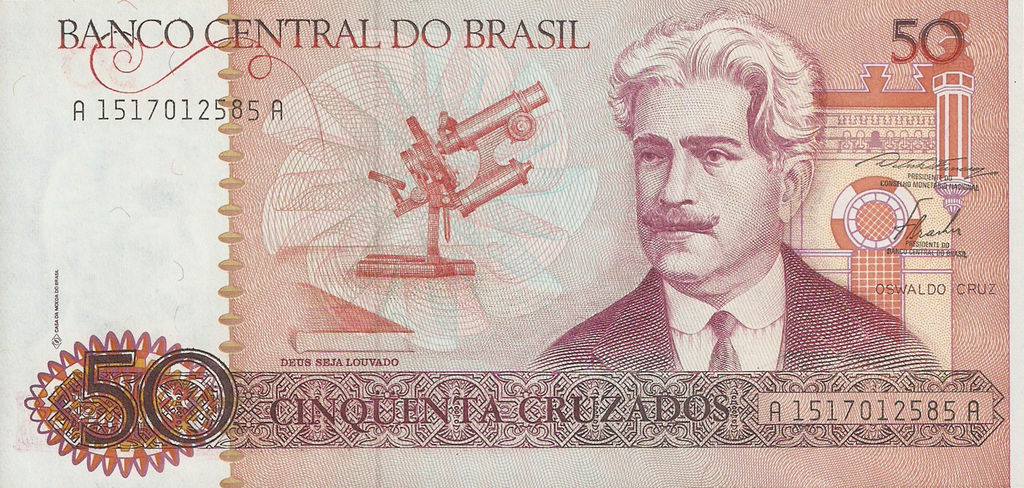|
Carlos Chagas Filho
Carlos Chagas Filho (September 10, 1910 – February 16, 2000) was a Brazilian physician, biologist and scientist active in the field of neuroscience. He was internationally renowned for his investigations on the neural mechanisms underlying the phenomenon of electrogenesis by the electroplaques of electric fishes. He was also an important scientific leader, being one of the founders of the Biophysics Institute of the Federal University of Rio de Janeiro and was also a president for 16 years of the Vatican's Pontifical Academy of Sciences, and president of the Brazilian Academy of Sciences (1965–1967). Life He was the second son of Carlos Chagas (1879–1934), an eminent scientist who is credited with the discovery of Chagas disease. His oldest brother was Evandro Chagas (1905–1940), also a physician and scientist specialized, like his father, in tropical medicine. He studied medicine from 1926 to 1931 at the Faculdade de Medicina da Universidade do Bra ... [...More Info...] [...Related Items...] OR: [Wikipedia] [Google] [Baidu] |
Rio De Janeiro
Rio de Janeiro ( , , ; literally 'River of January'), or simply Rio, is the capital of the state of the same name, Brazil's third-most populous state, and the second-most populous city in Brazil, after São Paulo. Listed by the GaWC as a beta global city, Rio de Janeiro is the sixth-most populous city in the Americas. Part of the city has been designated as a World Heritage Site, named "Rio de Janeiro: Carioca Landscapes between the Mountain and the Sea", on 1 July 2012 as a Cultural Landscape. Founded in 1565 by the Portuguese, the city was initially the seat of the Captaincy of Rio de Janeiro, a domain of the Portuguese Empire. In 1763, it became the capital of the State of Brazil, a state of the Portuguese Empire. In 1808, when the Portuguese Royal Court moved to Brazil, Rio de Janeiro became the seat of the court of Queen Maria I of Portugal. She subsequently, under the leadership of her son the prince regent João VI of Portugal, raised Brazil to the dignity of a k ... [...More Info...] [...Related Items...] OR: [Wikipedia] [Google] [Baidu] |
Carlos Chagas
Carlos Justiniano Ribeiro Chagas, or Carlos Chagas (; July 9, 1879 – November 8, 1934), was a Brazilian sanitary physician, scientist, and bacteriologist who worked as a clinician and researcher. He discovered Chagas disease, also called ''American trypanosomiasis'', in 1909, while he was working at the Oswaldo Cruz Institute in Rio de Janeiro. Chagas's work holds a unique place in the history of medicine. Working in primitive conditions, Chagas described in detail a previously-unknown infectious disease, its pathogen, vector (Triatominae), host, clinical manifestations, and epidemiology. Chagas was also the first to discover and illustrate the parasitic fungal genus ''Pneumocystis'', which later became infamous for being linked to pneumocystis pneumonia in AIDS patients. Early life Chagas was the son of José Justiniano das Chagas, a coffee farmer from Minas Gerais, and Mariana Cândida Chagas, both of Portuguese descent. After his secondary studies at Itu, São Paulo and S ... [...More Info...] [...Related Items...] OR: [Wikipedia] [Google] [Baidu] |
José Carneiro Felippe
José is a predominantly Spanish and Portuguese form of the given name Joseph. While spelled alike, this name is pronounced differently in each language: Spanish ; Portuguese (or ). In French, the name ''José'', pronounced , is an old vernacular form of Joseph, which is also in current usage as a given name. José is also commonly used as part of masculine name composites, such as José Manuel, José Maria or Antonio José, and also in female name composites like Maria José or Marie-José. The feminine written form is ''Josée'' as in French. In Netherlandic Dutch, however, ''José'' is a feminine given name and is pronounced ; it may occur as part of name composites like Marie-José or as a feminine first name in its own right; it can also be short for the name ''Josina'' and even a Dutch hypocorism of the name ''Johanna''. In England, Jose is originally a Romano-Celtic surname, and people with this family name can usually be found in, or traced to, the English county of C ... [...More Info...] [...Related Items...] OR: [Wikipedia] [Google] [Baidu] |
Miguel Osório De Almeida
Miguel Osório de Almeida (September 1, 1890 – December 2, 1952, both in Rio de Janeiro) was a noted Brazilian physician and scientist, brother of another scientist, Álvaro Osório de Almeida, both considered the ''fathers'' of modern physiology in Brazil. He studied medicine at the Faculdade de Medicina do Rio de Janeiro which presently is part of the Federal University of Rio de Janeiro. He was the chairman of physiology of the School of Agriculture and Veterinary Medicine of Rio de Janeiro and of the Instituto Oswaldo Cruz, the dean of the Universidade do Rio de Janeiro and member of the Brazilian Academy of Letters. He was author or co-author of several important studies on neurophysiology. He received the "Einstein Award" by the Brazilian Academy of Sciences and the "Sicard Prize" by the French Academy of Medicine in Paris. He was also one of the inspirers of the foundation of the Brazilian Society of Physiology The Brazilian Society of Physiology (Socieda ... [...More Info...] [...Related Items...] OR: [Wikipedia] [Google] [Baidu] |
Physiology
Physiology (; ) is the scientific study of functions and mechanisms in a living system. As a sub-discipline of biology, physiology focuses on how organisms, organ systems, individual organs, cells, and biomolecules carry out the chemical and physical functions in a living system. According to the classes of organisms, the field can be divided into medical physiology, animal physiology, plant physiology, cell physiology, and comparative physiology. Central to physiological functioning are biophysical and biochemical processes, homeostatic control mechanisms, and communication between cells. ''Physiological state'' is the condition of normal function. In contrast, ''pathological state'' refers to abnormal conditions, including human diseases. The Nobel Prize in Physiology or Medicine is awarded by the Royal Swedish Academy of Sciences for exceptional scientific achievements in physiology related to the field of medicine. Foundations Cells Although there are differ ... [...More Info...] [...Related Items...] OR: [Wikipedia] [Google] [Baidu] |
Minas Gerais
Minas Gerais () is a state in Southeastern Brazil. It ranks as the second most populous, the third by gross domestic product (GDP), and the fourth largest by area in the country. The state's capital and largest city, Belo Horizonte (literally "Beautiful Horizon"), is a major urban and finance center in Latin America, and the sixth largest municipality in Brazil, after the cities of São Paulo, Rio de Janeiro, Salvador, Brasília and Fortaleza, but its metropolitan area is the third largest in Brazil with just over 5.8 million inhabitants, after those of São Paulo and Rio de Janeiro. Nine Brazilian presidents were born in Minas Gerais, the most of any state. The state has 10.1% of the Brazilian population and is responsible for 8.7% of the Brazilian GDP. With an area of —larger than Metropolitan France—it is the fourth most extensive state in Brazil. The main producer of coffee and milk in the country, Minas Gerais is known for its heritage of architecture and colonia ... [...More Info...] [...Related Items...] OR: [Wikipedia] [Google] [Baidu] |
Lassance
Lassance is a Brazilian municipality located in the north of the state of Minas Gerais. In 2020 the population was 6,503 in a total area of 3,213 km². It became a municipality in 1953.IBGE Location and Distances Lassance is located on federal highway BR-496 at an elevation of 504 meters. It is south of the nearest population center, and north of Corinto. The municipality is crossed by the Rio das Velhas, a tributary of the . Neighboring m ...[...More Info...] [...Related Items...] OR: [Wikipedia] [Google] [Baidu] |
Hospital
A hospital is a health care institution providing patient treatment with specialized health science and auxiliary healthcare staff and medical equipment. The best-known type of hospital is the general hospital, which typically has an emergency department to treat urgent health problems ranging from fire and accident victims to a sudden illness. A district hospital typically is the major health care facility in its region, with many beds for intensive care and additional beds for patients who need long-term care. Specialized hospitals include trauma centers, rehabilitation hospitals, children's hospitals, seniors' (geriatric) hospitals, and hospitals for dealing with specific medical needs such as psychiatric treatment (see psychiatric hospital) and certain disease categories. Specialized hospitals can help reduce health care costs compared to general hospitals. Hospitals are classified as general, specialty, or government depending on the sources of income received. A teachi ... [...More Info...] [...Related Items...] OR: [Wikipedia] [Google] [Baidu] |
Oswaldo Cruz
Oswaldo Gonçalves Cruz, better known as Oswaldo Cruz (; August 5, 1872 – February 11, 1917), was a Brazilian physician, pioneer bacteriologist, epidemiologist and public health officer and the founder of the Oswaldo Cruz Institute. He occupied the fifth chair of the Brazilian Academy of Letters from 1912 until his death in 1917. Early years Oswaldo Gonçalves Cruz was born on August 5, 1872 in São Luis do Paraitinga, a small city in São Paulo Province, to the physician Bento Gonçalvez Cruz and Amália Bulhões Cruz. As a child, he moved to Rio de Janeiro with his family. At the age of 15 he started to study at the Faculty of Medicine of Rio de Janeiro and in 1892 he graduated as a medical doctor, with a thesis on water as vehicle for the propagation of microbes. Inspired by the work of Louis Pasteur, who had developed the germ theory of disease, four years later he went to Paris to specialize in bacteriology at the Pasteur Institute, which gathered the great names of th ... [...More Info...] [...Related Items...] OR: [Wikipedia] [Google] [Baidu] |
Instituto Oswaldo Cruz
The Oswaldo Cruz Foundation (Portuguese ''Fundação Oswaldo Cruz'', also known as FIOCRUZ) is a scientific institution for research and development in biological sciences located in Rio de Janeiro, Brazil; it is considered one of the world's main public health research institutions. It was founded by Dr. Oswaldo Cruz, a noted physician and epidemiologist. The organization started in 1898 as the Federal SeroTherapy Institute with the objective of developing serum and vaccines against the bubonic plague. It was located outside Rio de Janeiro. The institute's activities, however, changed from simple production into research and experimental medicine, especially after Oswaldo Cruz assumed its leadership in 1902. From there on, the institute became the base for memorable sanitation campaigns in an age of outbreaks and epidemics of the bubonic plague, yellow fever, and smallpox. The institute, however, was not confined to Rio de Janeiro and collaborated in the occupation of the count ... [...More Info...] [...Related Items...] OR: [Wikipedia] [Google] [Baidu] |
Medicine
Medicine is the science and practice of caring for a patient, managing the diagnosis, prognosis, prevention, treatment, palliation of their injury or disease, and promoting their health. Medicine encompasses a variety of health care practices evolved to maintain and restore health by the prevention and treatment of illness. Contemporary medicine applies biomedical sciences, biomedical research, genetics, and medical technology to diagnose, treat, and prevent injury and disease, typically through pharmaceuticals or surgery, but also through therapies as diverse as psychotherapy, external splints and traction, medical devices, biologics, and ionizing radiation, amongst others. Medicine has been practiced since prehistoric times, and for most of this time it was an art (an area of skill and knowledge), frequently having connections to the religious and philosophical beliefs of local culture. For example, a medicine man would apply herbs and say prayers for healing, o ... [...More Info...] [...Related Items...] OR: [Wikipedia] [Google] [Baidu] |






